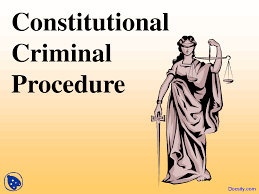- This course deals about the criminal procedural rights
enshrined under the constitution. It primarily focuses on the due process
rights under the Ethiopian constitution referring to the international
instruments. In the study of constitutional criminal procedure, sufficient
attention will be paid to the different types of due process rights contained
in the constitution and their interrelationship.
- The criminal procedure system
and various types of rights which will be affected by the criminal justice
system(right
of persons arrested, rights of persons accused, the rights of persons held in
custody and convicted prisoners and etc.) will be studied in relation to
the relevant laws. The course has been designed to acquaint students with the
principles and rules of modern criminal procedure in general; it examines the
pertinent provisions of the FDRE Constitution and the Criminal Procedure Code.
- The course also explores the laws and practices of selected jurisdictions, and
exposes the underlying structures of modern criminal procedure - throwing light
on three major processes of criminal procedure: the adversarial, inquisitorial
and mixed systems.
- The themes of concentrated discussion shall be principles and rules relating to the initiation of the criminal justice process (accusation, complaint and flagrant offense), summons and arrest, police investigation, confession, search and seizure, identification procedure, remedies for illegal arrest and search, remand, bail and habeas corpus.
- Criminal procedures for searches and seizures of evidence as constrained by the Ethiopian Constitution may affect the admissibility of forensic scientific analysis performed on the evidence in the laboratory. The forensic scientist should understand the constitutional dimensions of the law enforcement powers. In this course, significant Ethiopian Supreme Court cases will be read and discussed. This course is not an exhaustive or comprehensive study of the subject, but rather a survey of some of the major cases that affect everyday law enforcement.
Course Objectives:
procedure;
- The nature, structure and purposes of criminal procedure;
- Sources of criminal procedure rules;
- Pre-trial, trial and post trial criminal procedures;
- Constitutional and legal guarantees for the realization of fairness of the criminal justice system;
- The roles and functions of individuals, witnesses, victims, police, suspects, defense counsel, public prosecutor and judges in criminal proceedings;
- The conditions required to set the criminal justice in motion;
- The procedures used to gather evidence lawfully;
- The legal requirements for arrest;
- The rules applicable to remand in custody, bail, and habeas corpus;Remedies available for illegal arrest and search;
- The principles and rules that govern the determination of sufficiency of evidence to support criminal charges and convictions; the grant of arrest and search warrants, framing of criminal charges, holding of trial and delivery of judgment.

- Teacher: Shunmuga Sundaram